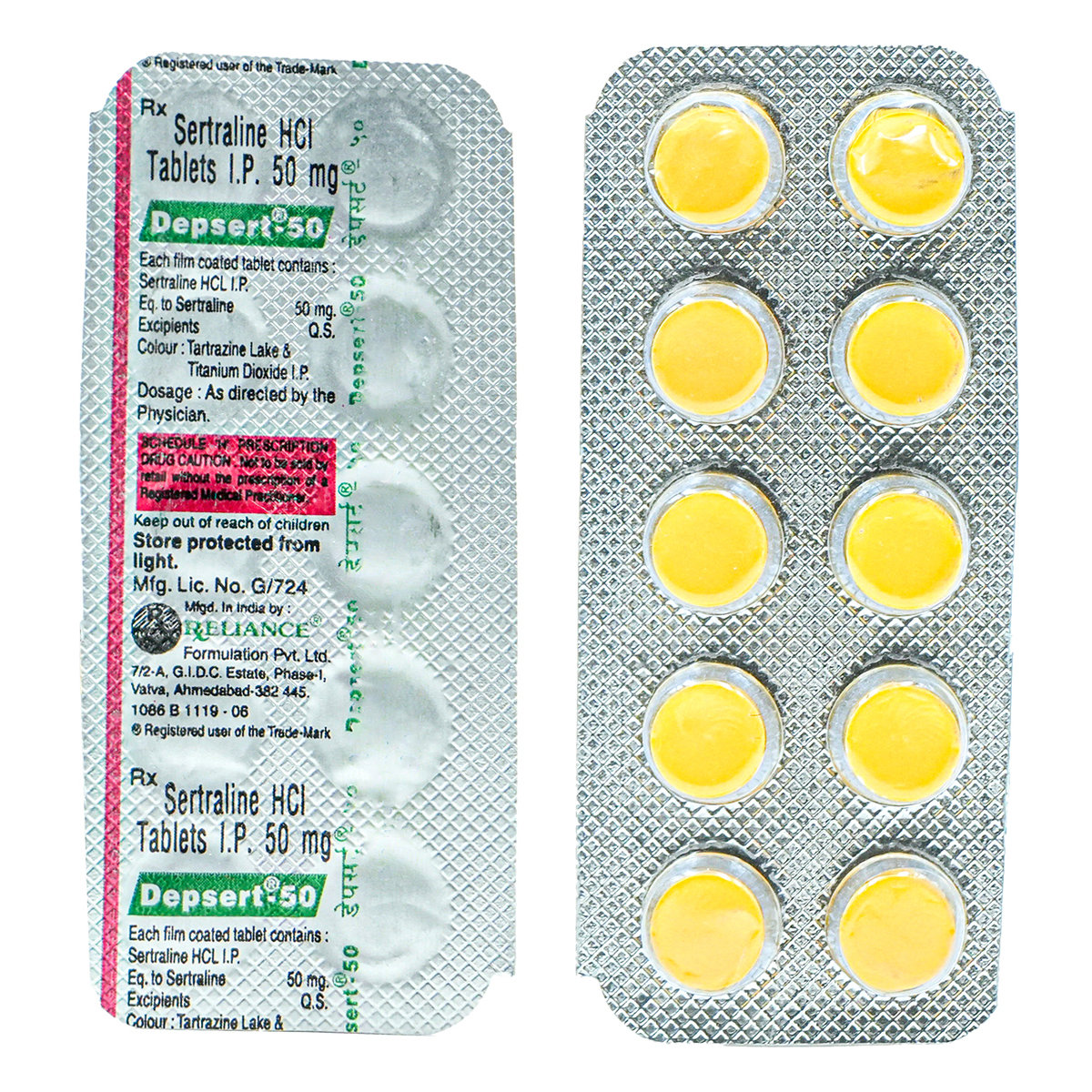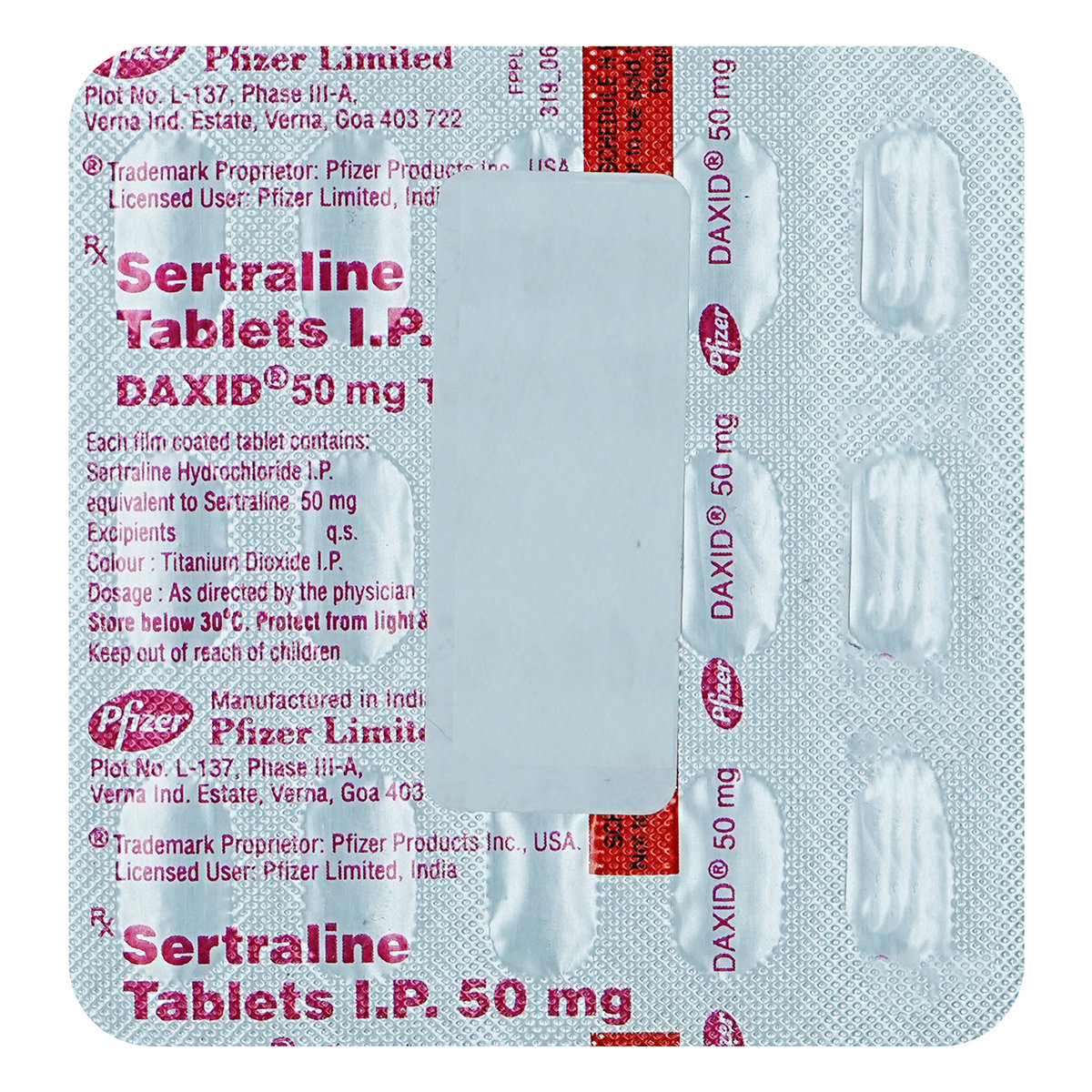Sertraline
About Sertraline
Sertraline belongs to a class of antidepressant drugs called selective serotonin reuptake inhibitors (SSRIs) used in the treatment of depression, post-traumatic stress disorder (PTSD), social anxiety disorder, panic disorder and obsessive-compulsive disorder (OCD). Depression is a mood disorder associated with symptoms such as sadness, unable to sleep properly or enjoy life as you used to do. OCD is a mental disorder with symptoms such as excessive thoughts or ideas (obsessions), leading to repetitive behaviours (compulsions). Panic disorder is linked to anxiety with sudden feelings of fear when there is no danger in reality. PTSD is a mental condition that occurs after experiencing a very emotional or terrifying event and has symptoms similar to anxiety and depression. Social anxiety disorder (social phobia) is associated with intense anxiety or distress in social situations.
Sertraline contains Sertraline that works by inhibiting the reabsorption of released serotonin back into the nerve cells. Thus, it increases serotonin activity (chemical messenger) in the brain that is involved in regulating mood, behaviour, and emotions. Thereby, Sertraline helps relieve depression, lighten the mood and relieve anxiety symptoms such as fear and panic.
Take Sertraline with or without food as prescribed by your doctor and swallow whole with a glass of water. Do not break, crush or chew it. Your doctor will advise you how often you take Sertraline based on your medical condition. Some people may experience drowsiness, dizziness, insomnia (difficulty in sleeping), dry mouth, nausea, headache, diarrhoea, tiredness or ejaculation failure. Most of these side effects of Sertraline do not require medical attention and gradually resolve over time. However, if the side effects persist or worsen, please consult your doctor.
If you are allergic to Sertraline or any other medicines, please tell your doctor. Sertraline may be used only to treat Obsessive-compulsive disorder (OCD) in children aged 6 to 17 years and not treat any other conditions in children below 18 years of age. Sertraline is not recommended for use during pregnancy, especially in the last 3 months. It may cause a serious condition in the baby, such as persistent pulmonary hypertension of the newborn (PPHN), which causes the baby to appear bluish and breathing faster. Therefore, please consult a doctor if you are pregnant or planning for pregnancy. Sertraline may be excreted in human milk. Please consult a doctor if you are a breastfeeding mother. Sertraline should be used with caution in elderly patients as there is an increased risk of low sodium levels in the blood. If you have any self-harming or suicidal thoughts before taking Sertraline, inform your doctor as they may worsen in the initial days of taking Sertraline. Do not take Sertraline with monoamine oxidase inhibitors (MAOIs) such as moclobemide and methylene blue to treat depression and opioids as it may cause severe adverse effects.
Uses of Sertraline
Medicinal Benefits
Sertraline contains Sertraline, an antidepressant that inhibits the reabsorption of released serotonin back into the nerve cells. Thus, it increases serotonin activity (chemical messenger) in the brain that is involved in regulating mood, behaviour, and emotions. Thereby, Sertraline helps relieve depression, lighten the mood and relieve anxiety symptoms such as fear and panic.
Directions for Use
Storage
Side Effects of Sertraline
- Drowsiness
- Dizziness
- Insomnia (sleeplessness)
- Dry mouth
- Nausea
- Headache
- Diarrhoea
- Tiredness
- Ejaculation failure
Drug Warnings
If you are allergic to Sertraline or any other medicines, please tell your doctor. Sertraline may be used only to treat Obsessive-compulsive disorder (OCD) in children aged 6 to 17 years and does not treat any other conditions in children below 18 years of age. Sertraline is not recommended for use during pregnancy, especially in the last 3 months. It may cause a serious condition in the baby, such as persistent pulmonary hypertension of the newborn (PPHN), which causes the baby to appear bluish and breathing faster. Therefore, please consult a doctor if you are pregnant or planning for pregnancy. Sertraline may be excreted in human milk. Please consult a doctor if you are a breastfeeding mother. Sertraline should be used with caution in elderly patients as there is an increased risk of low sodium levels in the blood. If you have any self-harming or suicidal thoughts before taking Sertraline, inform your doctor as they may worsen in the initial days of taking Sertraline. Do not take Sertraline with monoamine oxidase inhibitors (MAOIs) such as moclobemide and methylene blue to treat depression and opioids pain killer as it may cause severe adverse effects. If you have diabetes, fits, bipolar disorder, bleeding disorders, glaucoma, severe diarrhoea, low sodium or potassium levels in the blood, neuroleptic malignant syndrome or serotonin syndrome (potentially life-threatening conditions), liver or heart problems, inform your doctor before taking Sertraline.
Drug Interactions
Drug-Drug Interactions: Sertraline may have interaction with antiparkinson drug (selegiline), antibiotic (linezolid), antipsychotic drugs (pimozide, haloperidol, perphenazine, olanzapine, levomepromazine), opioid pain killers (buprenorphine, fentanyl, tramadol), opioid antagonists (naloxone), blood thinners (warfarin, ticlopidine), monoamine oxidase inhibitors used to treat depression (moclobemide, methylene blue), antifungals (fluconazole, posaconazole, voriconazole, ketoconazole, itraconazole), antibiotics (erythromycin, telithromycin, clarithromycin, levofloxacin), antidepressants (nefazodone, fluoxetine, fluvoxamine, amitriptyline, nortriptyline, desipramine), antimanic drug (lithium), anticonvulsants (phenytoin, carbamazepine, phenobarbital), painkillers (ibuprofen, aspirin), antidiabetic drug (tolbutamide), antacids (cimetidine, pantoprazole, rabeprazole, omeprazole, lansoprazole).
Drug-Food Interactions: Sertraline may interact with St. John’s wort (a herbal medicine used to treat depression) and grapefruit juice as they may increase the risk of a build-up of high levels of serotonin in the body. Also, avoid intake of alcohol while taking Sertraline as it may increase side effects such as drowsiness, dizziness or difficulty in concentrating.
Drug-Disease Interactions: If you have diabetes, fits, bipolar disorder, bleeding disorders, glaucoma, severe diarrhoea, low sodium or potassium levels in the blood, neuroleptic malignant syndrome or serotonin syndrome (potentially life-threatening conditions), liver or heart problems, inform your doctor before taking Sertraline.
Drug-Drug Interactions Checker List:
Safety Advice

Alcohol
unsafeAvoid consumption of alcohol with Sertraline as it may increase the risk of drowsiness, dizziness or difficulty in concentrating.

Pregnancy
unsafeSertraline is a Category C pregnancy drug and is not recommended for use during pregnancy especially in the last 3 months as it may cause a serious condition in the baby such as persistent pulmonary hypertension of the newborn (PPHN) which causes the baby to appear bluish and makes breathing faster. Therefore, please consult a doctor if you are pregnant or planning for pregnancy.

Breast Feeding
cautionSertraline may be excreted in human milk. Please consult a doctor if you are a breastfeeding mother. Sertraline is given to breastfeeding mothers only if the doctor thinks benefits are greater than risks.

Driving
unsafeSertraline may cause dizziness, drowsiness or impair thinking. Therefore, avoid driving if you experience any of these symptoms after taking Sertraline.

Liver
cautionTake Sertraline with caution, especially if you have a history of Liver diseases/conditions. The dose may be adjusted by your doctor as required.

Kidney
cautionIf you have any concerns regarding the use of Sertraline in patients with kidney problems, please consult a doctor.

Children
cautionSertraline may be used only to treat Obsessive-compulsive disorder (OCD) in children aged 6 to 17 years. Sertraline is not recommended to treat any other disorders in children below 18 years of age.
Habit Forming
Diet & Lifestyle Advise
- Maintain a diet rich in fruits, vegetables and whole grains. Avoid fried foods, high-fat dairy products, pastries and processed foods as they may worsen anxiety. Include foods rich in omega fatty acids such as fish, nuts, fresh fruits, vegetables and olive oils.
- Neurotransmitters are made up of amino acids. Amino acid-rich foods such as meat, dairy products, and certain fruits and vegetables help in the proper maintenance of neurotransmitters.
- Complex carbohydrates help in stimulating serotonin (a feel-good neurotransmitter). These include whole grains, legumes, spinach, broccoli, oranges and pears.
- Exercising helps in the production of the body’s natural antidepressants. It also helps in relieving stress, improving mood, boosts self-esteem, and provides restful sleep.
- Perform meditation and yoga. This helps in relieving stress and provides relaxation.
- Regularly attend therapy sessions.
- Follow a regular sleep pattern to improve the amount and quality of sleep you get.
- Avoid smoking and alcohol consumption.
Special Advise
- Sertraline may interfere with a urine test. Therefore, it is advised to inform your doctor or lab technician that you are taking Sertraline.
Patients Concern
Disease/Condition Glossary
Depression: It is a mood disorder associated with symptoms such as sadness, unable to sleep properly or enjoy life as you used to do. Depression can also influence some chronic health conditions and relationships. The exact cause of depression is unknown, but it may be associated with mental problems, trauma, family history, drugs use, and medical conditions.
Obsessive-compulsive disorder (OCD): It is a mental disorder with symptoms such as excessive thoughts or ideas (obsessions) leading to repetitive behaviours (compulsions).
Panic disorder: It is linked to anxiety with sudden fear even when there is no danger in reality.
Post-traumatic stress disorder (PTSD): It is a mental condition that occurs after experiencing a very emotional or terrifying event and has symptoms similar to anxiety and depression.
Social anxiety disorder: It is social phobia associated with intense anxiety or distress in social situations.
FAQs
Sertraline contains Sertraline, which inhibits the reabsorption of released serotonin back into the nerve cells. Thus, it increases the serotonin (chemical messenger) activity in the brain that regulates mood, behaviour and emotions. Thereby, Sertraline helps in relieving depression, lightening the mood and relieving anxiety symptoms such as fear and panic.
Yes, Sertraline may be used to treat a panic disorder by reducing fear. However, please consult a doctor before using the Sertraline.
No, you are not recommended to take Sertraline with opioids as co-administration of these medicines may cause adverse effects such as hallucinations, increased muscle tension, excessive sweating, fever, anxiety, involuntary, rhythmic contractions of muscles, including the muscles that control eye movement, tremor or even coma. However, before using Sertraline with any other medicines, you are advised to contact your doctor so that the dosage may be adjusted accordingly to use safely.
Yes, Sertraline may cause self-harming or suicidal thoughts, especially in patients aged less than 25 years or who have a history of self-harming thoughts. Therefore, please consult a doctor immediately if you experience any such thoughts while taking Sertraline.
It takes about 2 weeks or longer, usually for Sertraline to work. However, it is recommended to use Sertraline for as long as your doctor has prescribed it for you.
Sertraline may affect male fertility as it may reduce sperm quality. Therefore, please consult a doctor if you are planning to father a child.
Sertraline should be used with caution in diabetic patients as it may alter blood sugar levels. Therefore, regular monitoring of blood sugar levels is recommended while taking Sertraline, especially if you have diabetes, and the dose of diabetic medicines may be adjusted appropriately by your doctor.




